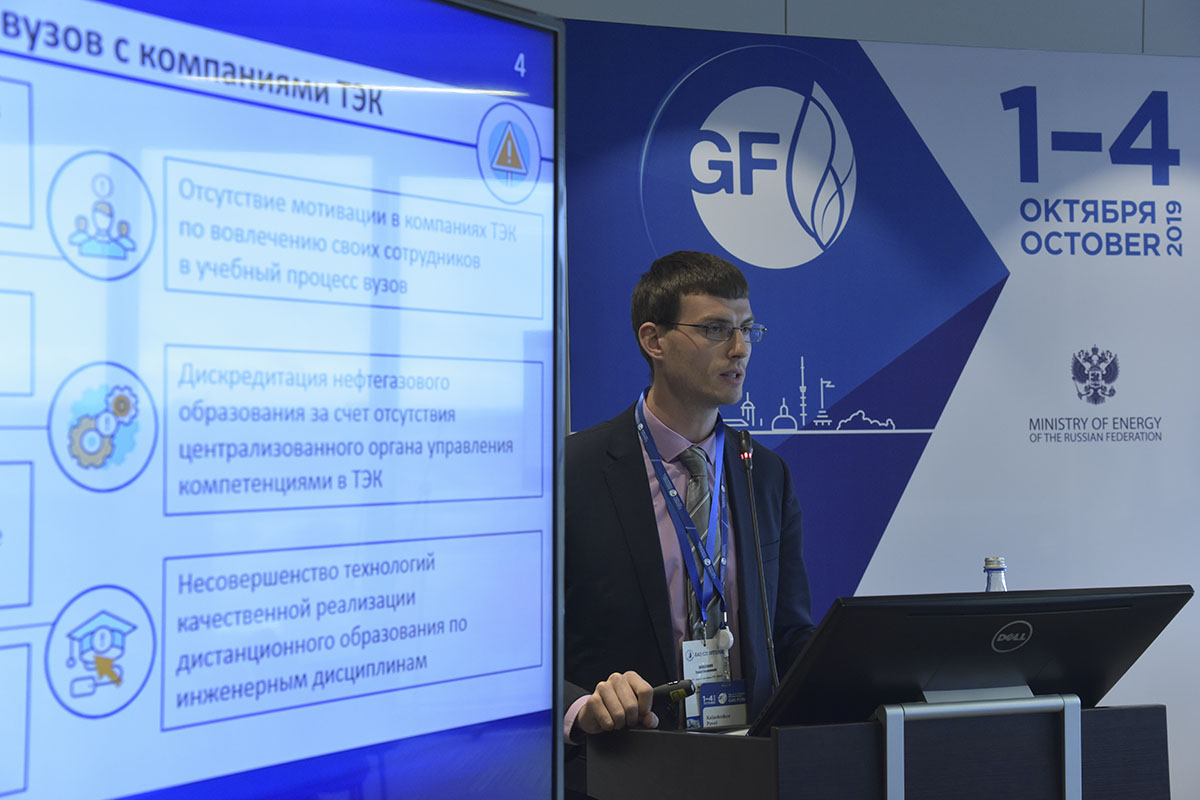Event news
Professionalism begins with quality education
For modern education in general and for company representatives in particular, this topic remains as ever relevant. During the session, the reports were delivered covering all the critical areas of interaction of educational institutions and industrial enterprises in the oil and gas industry.
Conference moderator, Yana Klementovichus, vice-rector of the St. Petersburg State Economic University for Further Education, Director of the Institute of Continuing Professional Education – Higher Economic School of St. Petersburg State Economic University, said she wished to discuss not only mutually beneficial cooperation, but also to address the issue of prospects for personnel and social policies of companies in the development of Russian oil and gas complex.
The first speaker who shared his experience was Marat Nagumanov, Director of the Research and Production Company Parker LLC. He highlighted several key points in building a production culture in a Russian company. The expert spoke about the company employees’ commitment to put their heads together in facing challenges and to follow several basic rules: long-term planning, creating the conditions for ensuring quality, developing an industrial culture and training. Mr. Nagumanov emphasized several features when building a system of work for Parker – this is the organisation of a stationary medical office, scientific and educational partnership, strategic dialogue and social activity.
Yevgeny Apayev, Head of the Personnel Training and Advanced Training Department of the HR Department of Transneft, also emphasized the importance of training of the workforce and cooperating with core universities and general educational institutions. "Having schools involved in the process by itself implies their future direction in the aspiration of raising professionals for the industry. On the whole, our company uses several levels of interaction with educational organisations: a corporate charity program for the development of school education, support and development of secondary vocational education, a program for developing the material and technical base of universities, unified programs for staff qualification and retraining."
The speaker said that Transneft, as part of the "school" program, carried out repairs in several classrooms, namely in physics and mathematics classrooms. Renovated facilities are now available to all students. In addition, the company is also making its best effort to bring in field-specific teachers.
"The program is becoming even more important in the context of the instruction of the President of the Russian Federation – the decree of May 7, 2018 "National goals and strategic objectives of development of the Russian Federation for the period up to 2024." Thus, we started this program somewhat earlier, and we are certainly proud of it. We will move on." – said the speaker.
As for higher education institutions, first of all, Transneft organises regional preparatory departments in cooperation with universities. Programs are being carried out in 7 leading oil and gas universities of the country.
"On top of that, we pay corporate scholarships to students. There are 115 of them at the moment. We are also supporting promising young teachers of specialised universities," – said Yevgeny Apayev.
Alexander Pechenkin, Director of Gazprom Corporate Institute, spoke about the role of partner universities in the implementation of target training programs for Gazprom Group employees, where staff development is regulated in the system of corporate continuing professional education for employees.
"The system has been built in concert with the the company's strategic development, with the human resources management policy in Gazprom and its subsidiaries. The development of the system is regulated on a regular basis by a comprehensive program to improve the effectiveness of resource management of Gazprom and includes the main cycles of training development. This process covers all relevant departments that are experts in various fields.”
The expert added that the company always seeks to interact with universities that have huge scientific and teaching potential, thereby enriching both the organisation and educational institutions.
A report on the main challenges of modern oil and gas education was made by Pavel Kalashnikov, Head of the Strategic Development Department of Gubkin Russian State University of Oil and Gas. He highlighted the primary restrictions on the interaction of universities with energy companies:
- Lack of industrial training grounds for testing, research, innovation;
- Information and technological openness;
- Lack of a structured industry request for fundamental and exploratory R&D efforts;
- Mutually exclusive requirements for publication activity by the Ministry of Education and Science and energy companies;
- Lack of motivation in the fuel and energy complex to involve its employees in the educational process of universities;
- Discrediting of oil and gas education due to the lack of a centralised competency management body in the fuel and energy complex;
- Imperfection of technologies for the quality implementation of distance education in engineering disciplines.
During the sessions, experts discussed a wide range of issues: the role of systematic training of senior executives, additional resources for fulfilling the task of developing oil and gas trading in companies, developing a simulation model for trading gas products and the specifics of interaction between production and education.


